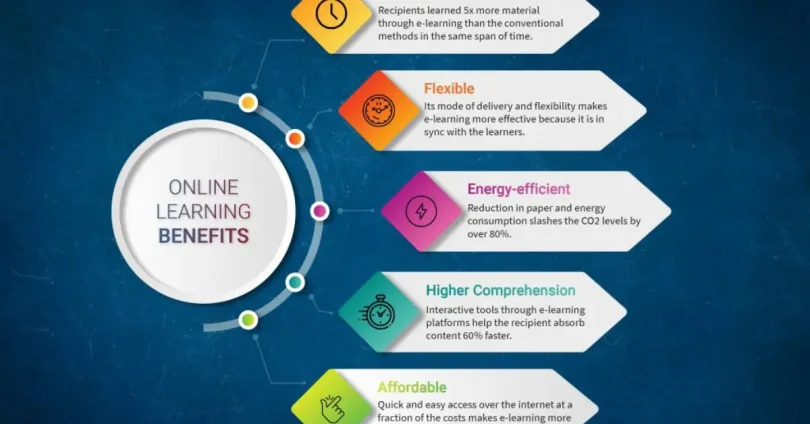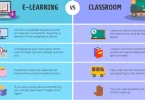Introduction
In recent years, online education has revolutionized the way we learn, making knowledge more accessible, flexible, and tailored than ever before. From school classrooms to corporate training rooms, digital learning is no longer just an alternative—it’s becoming the new norm.
Online education refers to any form of learning that takes place over the internet, using digital platforms, tools, and resources. It can include everything from full degree programs to short courses, video tutorials, or even mobile learning apps.
The purpose of this blog is to explore the key reasons why online education is so effective, and how it empowers learners of all ages and backgrounds to take control of their educational journey.
Flexibility and Convenience

One of the biggest advantages of online education is the freedom to learn anytime, anywhere. Unlike traditional classrooms with fixed schedules, online learning allows you to study at your own pace, whether it’s early in the morning, during lunch breaks, or late at night.
This flexibility makes online education especially valuable for:
- Working professionals balancing jobs and skill development
- Parents managing family responsibilities
- Students with varied learning speeds or personal commitments
Most platforms offer asynchronous learning options, where course materials—like video lectures, readings, and quizzes—are available on-demand. This allows learners to build a schedule that fits their lifestyle without missing out on content.
Case Example:
A working mom earning a degree online
Consider Sarah, a full-time marketing professional and mother of two. Traditional classes weren’t an option for her, but with online education, she enrolled in a part-time digital marketing program. She studies after putting her kids to bed and completes assignments over the weekend. This flexibility allowed her to advance her career—without sacrificing her family time.
Personalized Learning Experience
Online education offers a level of personalization that traditional classrooms often can’t match. Learners have the freedom to choose how, what, and when they learn, making the experience more engaging and effective.
Adaptive Learning Technologies
Many modern platforms use AI and adaptive learning algorithms to tailor content based on a learner’s performance. If you’re struggling with a concept, the system might offer extra practice. If you’re progressing quickly, it may skip ahead to more advanced material.
Choose Your Preferred Content Format
Whether you learn best through videos, audio lectures, readings, or interactive quizzes, online platforms let you pick the format that fits your style. This level of control helps boost comprehension and retention.
Track Progress and Adjust Speed
Learners can monitor their own progress, revisit difficult sections, and adjust the pace of learning as needed. This eliminates the pressure of keeping up with a group and creates a more supportive environment for mastery.
Supports Diverse Learning Styles
Whether you’re a visual learner who thrives on diagrams, an auditory learner who prefers podcasts, or a hands-on learner who benefits from interactive exercises, online education platforms are designed to accommodate diverse learning styles.
Access to Global Knowledge and Instructors

One of the most empowering aspects of online education is the ability to learn from the best minds in the world—no matter where you are. The internet has removed traditional geographic barriers, giving learners access to knowledge that was once limited to elite campuses.
Learn from Top Universities and Industry Experts
Through platforms like Coursera, edX, and LinkedIn Learning, you can enroll in courses taught by professors from Harvard, MIT, Stanford, Oxford, and other globally recognized institutions. These platforms also feature content from leading professionals at companies like Google, IBM, Meta, and Amazon, ensuring that the learning is not only academic but also industry-relevant.
No Geographic Barriers
Whether you’re in a major city or a remote rural area, online learning brings the classroom to you. There’s no need to relocate or commute—education travels with you, as long as you have an internet connection. This accessibility creates equal opportunities for learners around the world.
Cross-Border Peer Interaction
Online courses often include forums, peer reviews, and collaborative projects, where you can interact with fellow learners from different cultures, industries, and backgrounds. These global connections enhance the learning process by offering new perspectives, encouraging dialogue, and even leading to international networking opportunities.
Development of Self-Discipline and Accountability
While online education offers flexibility and freedom, it also requires a high level of self-motivation, time management, and personal responsibility—skills that are incredibly valuable far beyond the classroom.
Encourages Time Management and Personal Responsibility
With no fixed class times or face-to-face check-ins, learners must take charge of their schedules. This means planning study time, meeting deadlines, and staying on track without constant reminders from instructors. Over time, this builds strong time management habits and a sense of ownership over the learning process.
No Fixed Schedules = Higher Self-Motivation Required
The freedom to learn at your own pace is empowering—but it also demands self-discipline. There are no bells ringing or teachers checking attendance, so learners must stay motivated and consistent on their own. This kind of intrinsic motivation strengthens your ability to follow through on goals—academic, professional, or personal.
Builds Habits Useful for Work and Personal Growth
The habits developed through online learning—goal setting, self-monitoring, and accountability—translate directly into the workplace and daily life. Whether you’re managing a project at work or committing to a personal goal, the discipline you build as an online learner becomes a lifelong asset.
Cost-Effectiveness
One of the most appealing advantages of online education is its affordability. Whether you’re a student, professional, or lifelong learner, digital learning often costs significantly less than traditional education—without compromising on quality.
Lower Tuition or Free Courses
Many online platforms offer low-cost or even free courses from reputable universities and organizations. Learners can access world-class education without the hefty price tag of traditional degrees.
No Travel, Housing, or Textbook Costs
Online learning eliminates expenses like commuting, accommodation, and physical textbooks. Most materials are provided digitally, and you can study from the comfort of your home—saving both time and money.
Freemium Models for Students on a Budget
Platforms like Coursera, edX, and Udemy offer freemium models, where you can audit courses for free and only pay if you want a certificate. This makes high-quality learning accessible to students who might not have the budget for full programs.
Rich Multimedia and Interactive Learning Tools
Online education leverages a variety of multimedia and interactive features that make learning more engaging and effective than traditional lecture-based methods.
Videos, Simulations, Forums, Quizzes, Gamification
Courses often include videos, interactive simulations, discussion forums, quizzes, and even gamified elements like badges and leaderboards. These tools cater to different learning styles and make complex concepts easier to grasp.
Enhances Engagement and Understanding
Interactive content keeps learners actively involved, reducing boredom and increasing motivation. For example, simulations let you apply concepts in virtual environments, while forums provide opportunities to discuss ideas and clarify doubts.
Better for Memory Retention Than Lecture-Only Formats
Studies show that active participation and multisensory learning help improve memory retention. Compared to passive listening, engaging with varied content formats reinforces learning and supports long-term recall.
you may also like to read these posts:
Best Business Computers in 2025: Performance & Reliability
Powerful & Compact: Best Portable Mini PCs for Work
Exploring Various Budgeting Strategies to Take Control of Your Money
The Process of Using Online Tools for Effective Learning
Understanding the Effectiveness of Online Education: Reasons That Prove It Works
Promotes Lifelong Learning
Online education is not just for students—it’s a powerful resource for learners of all ages and stages who want to keep growing throughout their lives.
Suitable for All Ages and Stages
Whether you’re a high school student, a working professional, or a retiree, online courses cater to your unique needs and interests. The accessibility and variety make it easy to jump in at any point in your life.
Learn New Skills, Switch Careers, or Follow Hobbies
From mastering coding and data science to exploring photography or cooking, online learning supports diverse goals. It’s a flexible way to upskill for career changes or pursue personal passions at your own pace.
Constant Updates Keep Content Current and Relevant
Online platforms frequently update their materials to reflect the latest knowledge, trends, and technologies. This means learners always have access to fresh, relevant content—a crucial advantage in fast-changing industries.
Accessibility and Inclusivity
Online education is breaking down barriers to learning by making education more accessible and inclusive for everyone, regardless of location or ability.
Accommodates People with Disabilities
Many platforms incorporate features like closed captions, transcripts, screen reader compatibility, and adjustable text sizes. These tools ensure that learners with visual, hearing, or cognitive impairments can fully participate.
Education for Rural or Remote Areas
Learners in rural or remote locations can access high-quality courses without the need to travel to urban centers or relocate. This bridges educational gaps caused by geographic isolation.
Mobile-Friendly and Low-Bandwidth Options
Online learning platforms are increasingly designed to work well on mobile devices and offer options for low-bandwidth connections, making education available to users with limited internet access or older devices.
Environmentally Friendly
Online education also contributes positively to the environment by promoting sustainable learning practices.
Reduced Commuting = Lower Carbon Footprint
By eliminating the need to travel to physical classrooms, online learning significantly reduces carbon emissions associated with commuting and campus operations.
Less Paper Usage and Facility Overhead
Digital course materials minimize paper consumption, and the reduced need for physical infrastructure lowers energy use and waste.
Supports Sustainable Education Models
This eco-friendly approach helps create sustainable education systems that balance learning needs with environmental responsibility.
Faqs:
Is online education as effective as traditional classroom learning?
Yes, studies show that online education can be equally or more effective, especially when it includes interactive tools, flexible pacing, and personalized content. Success depends on the learner’s motivation and the quality of the platform.
Who benefits the most from online education?
Online education is ideal for working professionals, stay-at-home parents, remote learners, and anyone needing flexible schedules or self-paced learning options.
Are online courses recognized by employers?
Many online programs from accredited institutions or platforms like Coursera, Udemy, and edX are widely recognized. Employers value skills and certifications, especially when aligned with job roles.
What are the main challenges of online learning?
Some common challenges include lack of face-to-face interaction, distractions at home, and the need for strong time-management skills. However, these can be overcome with discipline and the right tools.
How do I stay motivated while learning online?
Set clear goals, create a study schedule, use interactive tools, and join discussion forums or study groups to stay engaged and accountable.
Conclusion:
Online education has transformed the way we access and engage with learning. With its flexibility, affordability, and ability to cater to diverse learning needs, it empowers individuals to take control of their education—whether they’re pursuing a degree, upskilling for a job, or exploring a personal interest. While it does come with challenges, the benefits far outweigh them when approached with discipline and the right tools. As technology continues to advance, online education will only become more powerful, personalized, and accessible—making it a key driver of lifelong learning in the digital age.




